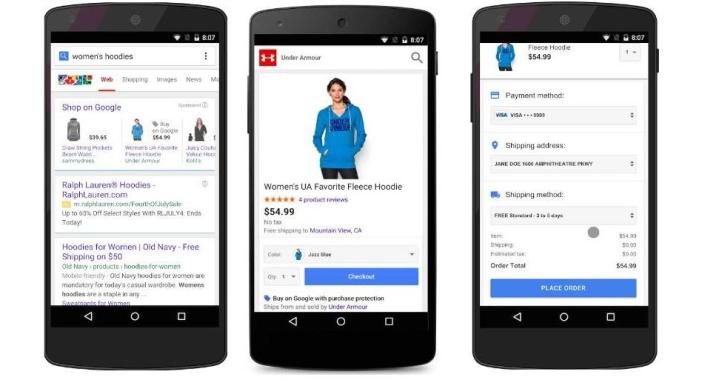
Thanks to mobile devices and the Internet, he explained, the experience of searching for and buying products has changed. It’s no longer just about visiting a store or a brand’s dot-com storefront — people are buying in all sorts of new ways.
Including on the toilet. (Yours truly included, to be honest.)
To help facilitate all those transactions — and take a small slice of that pie for itself — Google today announced “Purchases on Google,” but let’s just call it the Buy Button, a way for the company to host branded shopping pages for retailers that will let customers buy using the shopping credentials they’ve already stored on Google.
Buy it now
Purchases on Google is meant to reduce the “friction” of mobile transactions by simplifying it. As Alferness explained: “We’re not trying to get in the way of the merchants owning their customers.” Click into one from a Google ad and you’ll get to a microsite hosted by the search giant but totally branded by the retailer. You’ll be able to search these Google microsites for additional products from a retailer, and there will be links back to the retailer’s site as well. The company is testing the buy button with a dozen or so large merchants, Alferness explained, including Under Armour.
Once the company is successful at that scale, it will ramp up in earnest. Google aims for a larger roll out “toward the back half of the year.” Expect to see Google buy buttons in a browser near you in the next few weeks.
It may sound like a land grab for money, but the company is addressing a very real issue. Despite the inroads made by mobile devices and the Internet, 93 percent of retail commerce takes place in the physical environment, according to stats shared by Google from the Department of Commerce. Sure, there’s been a 115 percent increase in shopping searches from smartphones globally, but it’s a very small slice of the pie.
Mobile is having a huge impact on retail, yet digital sales activity is only half as likely to result in people actually buying anything, the company said. Why? Friction. It’s simply too hard, too many clicks, too much entering of numbers, too much that could go wrong.
“We’re not trying to get in the way of the merchants owning their customers.”
Big changes to online shopping
The news was merely one part of a large rollout of products at the New York event, thanks mainly to the changing nature of how we shop for products — and thanks to mobile, of course. “Mobile is really central to everything we’re doing at Google,” Alferness said, further noting that a trillion dollars of U.S. retail sales were influenced by mobile and mobile devices.
The figures from Deloitte are even higher: The research firm concluded that $2.2 trillion of sales were influenced by digital in a recent study. To that end, Google announced Conversational Search for Shopping. Ask Google a shopping-related question and, in addition to a card with relevant data, the phone will respond with a commerce-related answer.
And there are new product review cards that aggregate review results from major sites (including this one) and tell you what the experts think of a product. Plus the Google Now Price Drop card, which yes, tells you when the price falls on something you’ve shopped for. “This brings the magic that Google has to offer to consumers in a new way … we’re really trying to help simplify their lives,” Alferness said.
There are other changes for the holiday shopping season as well. The company has long offered deep linking directly into apps, that let someone send you to a specific page in the New York Times app or a certain recipe in a database app, but until now this didn’t involve shopping.
Meet “app deep-linking for shopping,” (if we have to give such a feature a name). And Android Pay is yet another response to the changing nature of retail — expect to see it widely available later this year in a commerce app near you. “Imagine never having to fumble through your wallet and find your right card to hand to the cashier,” Alferness explained. Just let Google put its hands in your wallet and do it for you. Easy, right?
